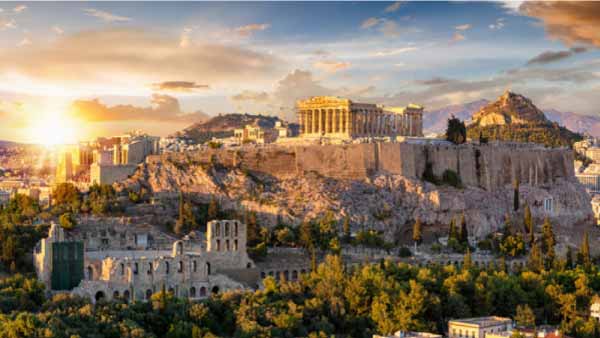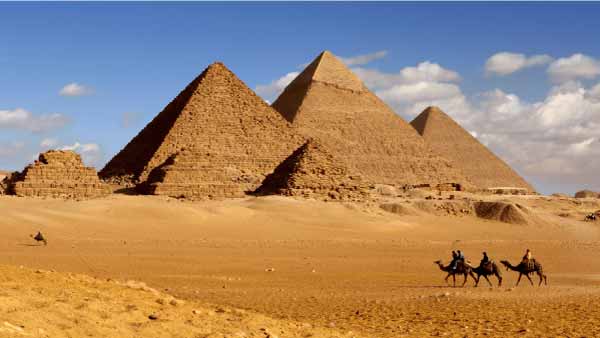Greek civilization is one of the most important and influential in human history. It developed in the eastern Mediterranean region, mainly on the Greek peninsula and nearby islands, between the eighth and fourth centuries BC.
The Greeks excelled in different areas such as philosophy, literature, politics, art, architecture, science, sports and religion, among others. The city-state was the most common form of political organization in ancient Greece, with Athens and Sparta being the best known.
In philosophy, thinkers such as Plato, Aristotle and Socrates stand out, who influenced Western philosophy and many other areas of knowledge. Greek literature also had a great influence on Western culture, highlighting works such as Homer’s Iliad and Odyssey, and the plays of authors such as Aeschylus, Sophocles and Euripides.
In Greek art, sculpture and architecture are well known for their perfection and beauty, such as the statue of the goddess Athena in the Parthenon in Athens. In science, the Greeks made important contributions in mathematics, physics, and medicine, such as the Pythagorean theorem and Hippocrates’ theories of medicine.
The Greeks believed in various gods and goddesses, such as Zeus, Aphrodite, Ares, Poseidon, and Athena, and their mythology has been a source of inspiration for many literary and artistic works.
In short, Greek civilization left an impressive cultural and artistic legacy, which has influenced the history of mankind to this day.
Achievements
Greek civilization achieved important advances in various areas of knowledge and culture, some of which are:
Philosophy: The Greeks were pioneers in Western philosophy, with important thinkers such as Plato, Aristotle, Socrates, Epicurus, and others. His ideas and theories have influenced Western philosophy, politics and culture to this day.
Literature: Greek literature is one of the most influential in history, with masterpieces such as Homer’s Iliad and Odyssey, the plays of Aeschylus, Sophocles and Euripides, the fables of Aesop, among others.
Architecture and art: The Greeks were masters at constructing buildings and creating works of art, such as the statue of the goddess Athena in the Parthenon in Athens. Its architecture and artistic style are characterized by elegance, proportion and symmetry.
Science: The Greeks made important contributions in mathematics, physics, medicine, and other areas. Pythagoras formulated his famous theorem, Euclid developed the elements of geometry, and Hippocrates laid the foundations of modern medicine.
Politics: democracy was born in ancient Athens, with the creation of the popular assembly and the election of rulers by lot. The idea of citizenship and political rights were also important achievements of Greek civilization.
In summary, the Greek civilization achieved important advances in various areas of knowledge and culture, which have influenced the history of mankind to this day.
Artworks
Greek civilization produced some of the most famous and recognized works of art in human history. Here are some of the highlights:
The statue of the goddess Athena in the Parthenon of Athens
This is one of the most famous works of Greek art. It was carved in marble by the sculptor Phidias in the fifth century BC and is located on the Acropolis of Athens. The statue of Athena, the goddess of wisdom and war, is considered one of the most beautiful and perfect of antiquity.
The Discobolus of Myron
This bronze sculpture depicts an athlete throwing a discus. It was created by the sculptor Miron in the fifth century BC and is considered one of the masterpieces of Greek sculpture. It is in the collection of the British Museum in London.
The Venus de Milo
This is a famous marble sculpture depicting the goddess Venus. It was created in the second century BC by an unknown sculptor and is housed in the Louvre Museum in Paris. The Venus de Milo is considered one of the most famous works of Greek art and a symbol of female beauty.
The Parthenon
This is one of the most famous buildings in ancient Greece. It was built in Athens in the fifth century BC as a temple dedicated to the goddess Athena. The Parthenon is considered a masterpiece of Greek architecture, with its symmetrical design and perfect proportions.
Vessel paintings
Pottery was an important artistic medium in ancient Greece. The vases and vases were decorated with scenes of everyday life, myths and legends. The paintings on the vases were highly detailed and full of color, and have been an important source of information about life in ancient Greece.
These are just a few of the most famous and outstanding works of art of Greek civilization. However, there are many other works that are equally important and that demonstrate the skill and creativity of Greek artists.
Religion
Religion was an important part of life in Greek civilization and was closely linked to the culture and society of the time. Greek religion was characterized by belief in multiple gods and goddesses, each with their own personality, history, and attributes.
The Greek gods and goddesses were anthropomorphic, that is, they had human appearance and behavior, although they also possessed supernatural abilities. Some of the most important gods include Zeus, the king of the gods and goddess of wisdom and war; Apollo, god of music, poetry and light; Athena, goddess of wisdom, strategy and craftsmanship; Aphrodite, goddess of love and beauty; and Hades, god of the underworld.
The Greeks worshipped their gods and goddesses by performing rituals and ceremonies in temples and shrines. Religious festivals were an important part of Greek life and were celebrated in honor of gods and goddesses. These festivals included athletic games, parades, banquets, and animal sacrifices.
Greek religion also included belief in life after death. The Greeks believed that the dead went to the underworld, a place ruled by Hades and where the souls of the dead received their fate. The Greeks believed that the afterlife depended on the actions performed during life and that heroes and virtuous mortals were rewarded in the afterlife.
In short, religion was an important part of Greek civilization, which was characterized by belief in multiple gods and goddesses, the performance of rituals and ceremonies in temples and shrines, and the belief in life after death.
Political organization
The political organization of Greek civilization varied over the centuries and in different regions, but we can identify some important forms of government that developed at different times and places. These are the main forms of government of ancient Greece:
Monarchy: In monarchy, a king ruled a Greek city-state. Power was passed on hereditarily within a royal family. Monarchy was the predominant form of government in the archaic era of ancient Greece.
Oligarchy: In the oligarchy, a small group of people ruled the city-state. This form of government was common in city-states such as Sparta, where a small group of aristocrats held political and economic power.
Democracy: In democracy, power was in the hands of the citizens of the city-state, who made political decisions through assemblies and votes. Democracy developed in the city-state of Athens in the fifth century BC and is considered the most significant form of government in ancient Greece.
Athenian democracy allowed all citizens (free men over the age of 18 who were born in Athens and had Athenian parents) to participate in the assembly, which met several times a month. In these assemblies, important decisions were made such as the election of magistrates, the approval of laws and the declaration of war. Citizens also participated in trials and could be elected to public office. However, it should be noted that in Athenian democracy, women, foreigners and slaves had no right to participate in political life.
In summary, the political organization of Greek civilization varied at different times and places, but important forms of government such as monarchy, oligarchy and democracy can be identified, the latter being considered the most significant and developed in the city-state of Athens.
Literature
Greek literature is one of the most important and influential in history. Below are some of the most outstanding works of Greek literature:
The Iliad and the Odyssey: These are two epics written by Homer in the eighth century B.C. The Iliad tells the story of the Trojan War, while the Odyssey tells the return home of the hero Odysseus after the war.
Greek tragedies: Tragedies were plays that explored themes such as justice, fate, and free will. Some of the most famous works are those of Aeschylus, Sophocles and Euripides. Among the most outstanding works are “Oedipus the King” by Sophocles, “The Coephorae” by Aeschylus and “The Bacchae” by Euripides.
Greek comedy: Greek comedy was a genre of theater that was characterized by its humor and social satire. The most famous work is “The Birds” by Aristophanes.
The Platonic Dialogues: Plato wrote a series of philosophical dialogues that explored themes such as truth, justice, and morality. Among the most outstanding works are “The Republic”, “The Banquet” and “Phaedo”.
The works of lyric poets such as Sappho, Pindar and Anacreon, who wrote poems about love, nature and everyday life.
Greek literature has influenced Western literature and has been the object of study and admiration for centuries. Many of the ideas and themes presented in Greek literature, such as the search for truth and justice, are still relevant today.
Architecture
The architecture of Greek civilization is one of the most influential in the history of Western architecture. The Greeks developed an architectural style that was characterized by the elegance and simplicity of its forms, as well as its emphasis on harmony and balance.
Some of the most outstanding features of Greek architecture are:
The use of columns: Columns were a fundamental feature of Greek architecture. There were three types of columns: Doric, Ionic, and Corinthian. The columns were used to support the weight of the buildings and give them a sense of elevation and verticality.
The use of the pediment: the pediment was an architectural element that was placed on the front of the buildings. It was a triangle decorated with sculptures that gave the buildings a grandiose and majestic appearance.
The emphasis on proportion and symmetry: Greek architects were very careful in the design of buildings, making sure that proportions and symmetry were perfect. This contributed to the sense of harmony and balance that characterizes Greek architecture.
Among the most important buildings of Greek architecture are:
The Parthenon: The Parthenon is a temple dedicated to the goddess Athena, built on the Acropolis of Athens in the fifth century BC. It is one of the most important buildings of Greek architecture and has been the object of study and admiration for centuries.
The Theatre of Epidaurus: The Theatre of Epidaurus is an ancient theatre located in the Peloponnese. It was built in the fourth century BC and is considered one of the best preserved theaters of ancient Greece.
The Temple of Olympian Zeus: The Temple of Olympian Zeus is a temple located in Athens. It was built in the sixth century BC and is one of the largest and most ambitious buildings of Greek architecture.
Greek architecture has influenced Western architecture for centuries, and its emphasis on elegance, simplicity, and proportion remains a source of inspiration for architects around the world.
Sport
The ancient Greeks highly valued sport and considered it an important part of their culture. Sports games and competitions were part of religious celebrations and were held in honor of the gods.
Among the most popular sports of ancient Greece were:
The Olympic Games: The Olympic Games were a sports competition held every four years in Olympia. The games included disciplines such as racing, wrestling, discus throwing, and long jump. The winners of the Olympic Games were considered heroes in Greek society.
Wrestling: Wrestling was one of the most popular sports in ancient Greece. The wrestlers faced each other in a circular enclosure called a palestra and tried to knock the opponent to the ground.
Pentathlon: The pentathlon was a competition that included five disciplines: running, long jump, discus throw, wrestling, and javelin throw.
Boxing: Boxing was a sport that was practiced with leather gloves and was characterized by its brutality. Boxers tried to knock out the opponent by hitting him on the head and body.
Racing: Racing was an important discipline in the Olympic Games and was held at different distances, from 200 meters to 4 kilometers.
The practice of sport in ancient Greece was not only valued for its physical benefits, but also for its moral and educational value. The Greeks believed that sport helped develop discipline, willpower and competitive spirit, and that these skills were important for the development of a strong and virtuous society.


